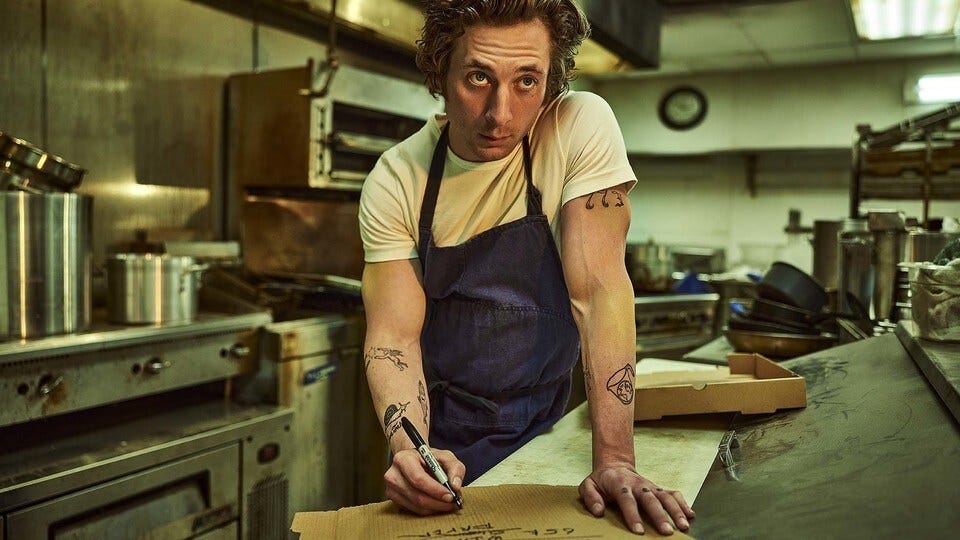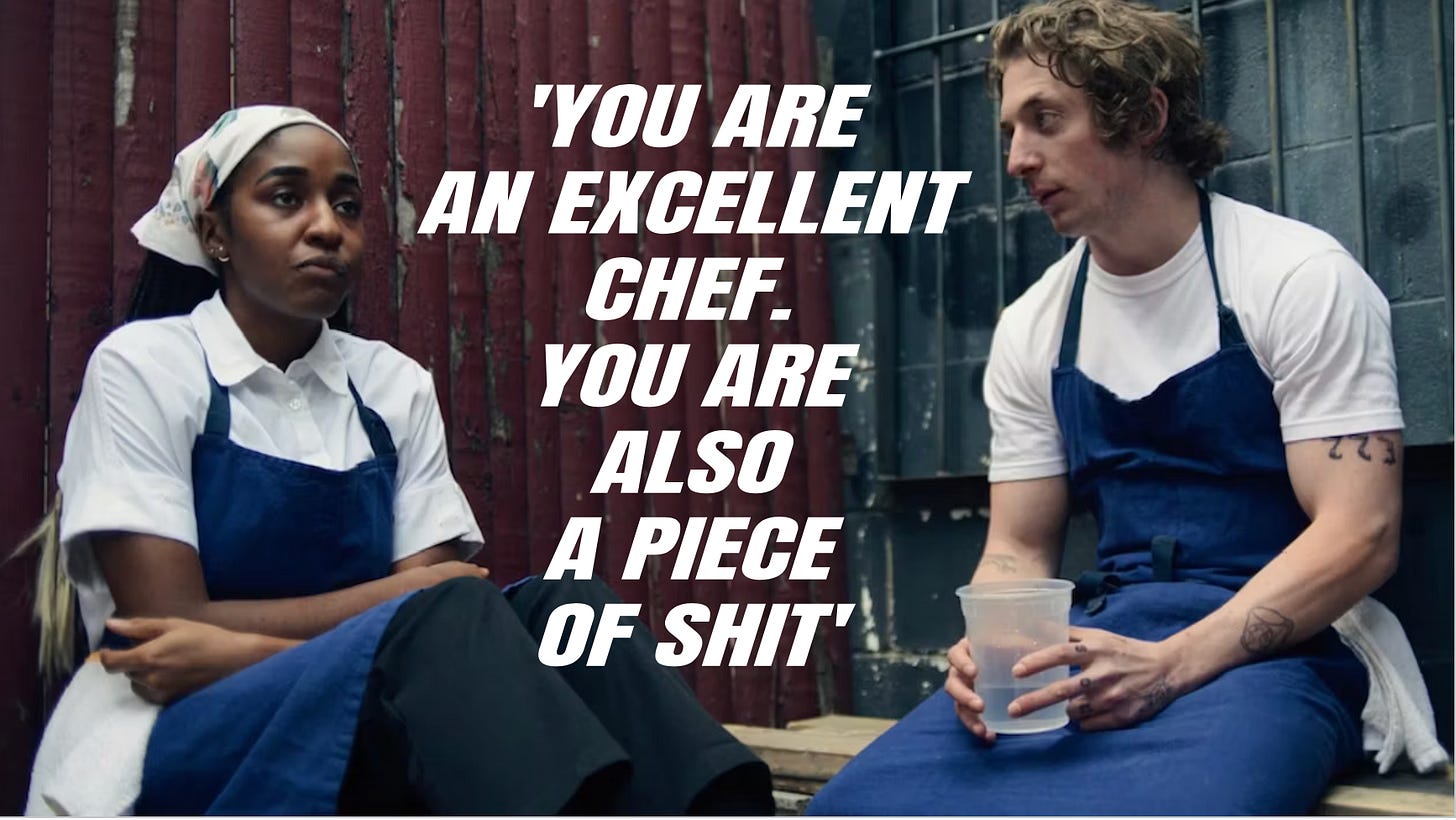
The best show on TV is back tonight
Plenty has already been written in praise of The Bear and I will avoid retreading much of it, but for those of you who haven’t watched it yet, you are missing out.
(If you need proof of my love, please feel free to watch/read The Heat, which is essentially warmed-up high-velocity fan fiction for the show).
Why is it that whilst Netflix, Apple and Amazon are throwing colossal amounts of money at making space opera, big-budget sci-fi and a Lord of The Rings franchise that is also the most expensive TV ever made, viewers are tuning in to the story of a struggling restaurant in Chicago? The love for the show is not just about the excellent writing, direction, or performances, nor is it due to all the kitchen knife purchases, amateur gastronomy, and workwear outfits that it will have inspired. It’s not even due to Jeremy Allen White’s sudden ascent as an unlikely sex symbol.
One of the things that I’ve noticed as I’ve bored the tits off friends about it in pubs, meetings and on nights out is that it’s a show that seems to call to a particular sort of person in quite a fundamental way. It wears its elementary and deeply American set of values on the sleeve of its tightly-fitted white t-shirts1, and it seems to function as a sort of televisual Rorschach test for people who long to be great at something.
The Bear is about the high price of excellence.
In an era where Quiet Quitting has billions of mentions on TikTok, and where the internet is awash with self-help deepities, shallow aphorisms and saccharine bullshit about doing something great with little mention of what is actually required to do it, The Bear has no easy roads to offer its viewers, nor cheap victories.
It pays tribute to talent, but only when it’s yoked to graft and the willingness to sacrifice for the sake of something great. It doesn’t believe or want to deceive its viewers into thinking that achievement comes easy, or without a cost.
A failure is a man who doesn’t know what he wants, or jibs at the price. - W.H. Auden
The show’s creators want us all to know that true accomplishment comes with its attendant taxes in failed relationships, collapsed friendships, birthdays missed and the countless other things that get neglected for you to be good.
It treads the thin line between passion, ambition, and obsession, and how those things can blur into one another. Along with Anthony Bourdain’s Kitchen Confidential, its detailed exploration of this theme makes The Bear’s nearest cultural predecessors anything that explores how brilliance is made and what its human toll is. It’s a sort of nuanced culinary rejoinder to Whiplash - which went off like a cinematic dirty bomb in American culture precisely because it implied that the suffering inflicted on its protagonist (‘were you rushing, or were you dragging?’) might also have been the fuel for his ascent into musical greatness.
It also reminds me of Wright Thompson’s excellent collection of sporting journalism The Cost of These Dreams, which digs into the pain that so often fuels sporting greatness (the essay on Tiger Woods and his father is worth the price alone).
Most obviously, it also drinks from the same well as Robert Caro’s mammoth biography of President Lyndon B. Johnson. Caro embodies his central theme, a biographer whose commitment to his craft is in itself a demonstration of the same dedication and fanaticism that he explores in his subjects.
‘If you do everything, you’ll win.’ - President Lyndon B. Johnson
What all these works have in common is that they excavate in painstaking detail precisely where the uncommon drive for excellence springs from, what greatness looks like in action, and what achieving it costs both for those who strive for it, and the people that care for them. The Bear understands that what we see as the drive for excellence in some people is often a kind of fleeing from something, as dramatised in Carmy’s AA Monologue at the end of Season 1, one of the single finest pieces of writing, direction and performance that I’ve ever watched.
‘Trying to fix the restaurant was me trying to fix whatever was happening with my brother.’ - Carmy Berzatto
In Carmy’s relationship with the Berzatto family, we get a glimpse of what sort of background might provide enough combustible fuel to propel someone into the top echelons of the culinary world. In his treatment of his colleagues, and his girlfriend, we see what that ascent can cost.
The constant refrain of this show is: you can be good at something. You might even be excellent. But that excellence will come at a price.
I’m still not sure where I sit on this question. I’m hesitant to tip the scales of a cultural discourse that seems on one hand to view humans as machines who can continually be tinkered with to extract greater gains, and on the other to lie about what it takes to do anything half-decent. I am nowhere near excellent in any of the fields that I would like to master, and I can see few roads to get there other than via a shitload of hard work. Almost everything in my life that I’m proud of in some way demanded something of me that I didn’t initially see myself as capable of giving.
I’ve always thought that Balzac might have been onto something when he wrote that all people have only a certain amount of vital fluid inside them, and that it needed to be husbanded or spent to achieve their goals. It sounds ludicrous until you substitute ‘vital fluid’ for ‘time’ or ‘energy’, at which point it acquires the unshakeable force of universal truth.
Life can feel like an endless series of trade-offs between work and family, earning and living, ambition and friendship - and so whenever I meet anyone who is excellent at anything, one of the first things I find myself considering is the price of it: what exactly have they neglected, ignored, or abandoned to attain it? People running creative companies that need passion and friction to produce good results navigate the same tangled mess that The Bear explores every single day, and often tread the line daily between ambition and obsession. I’ve worked in a few palaces of joyless excellence, but I’ve also worked in some temples of aggressive mediocrity - it can be as hard to produce something average as something great, and half-arseing it at work is no guarantee of an easy life. But if you’re prepared to torch everything in pursuit of your burning ambition, you may look around at the finish line and find that victory is hollow and you have no-one left to share it with.
“If something takes too long, something happens to you. You become all and only the thing you want and nothing else, for you have paid too much for it, too much in wanting and too much in waiting and too much in getting.” - Robert Penn Warren, All The King’s Men
So as well as being stellar entertainment, The Bear contains a soupçon of philosophy worth savouring. To go with its brutally exacting idea of how great work happens, it offers us solace too: in pursuing excellence, you will find your people. The crew at The Beef and The Bear aim at greatness, but they also find kindred spirits in chasing a shared goal and the high standards needed to reach it. In several of the character arcs - most particularly that of Cousin Ritchie - it offers a glimpse of how even deeply flawed people might remake themselves through dedication to a collective endeavour.
As Anthony Bourdain wrote about in Kitchen Confidential, kitchens can offer a version of community available to a wide range of people, even within the rigged game of American capitalism where restaurants face terrible odds of survival. Excellence is the goal, but the family and friendship that can flower even under the immense pressure of pursuing perfection ends up being the reward - and that’s something that all of us can aim for, no matter what we do.
So The Gospel of The Bear is: greatness doesn’t come for free, but it shouldn’t cost everything.
Whilst billionaires are sending rockets into space (and I will not bash them for that), The Bear serves us up a vision of excellence that is available to pick up a kitchen knife and do the work, and a version of family big enough to subsume anyone’s flaws so long as they want to be good badly enough.
If you haven’t watched it yet, take the time and dine well on this absolute feast of a show. I’ll be in the kitchen with my Santoku and chopping board, trying to cook a little better than I did last time, and hoping to feed a few good friends into the bargain.
The germ of this piece came from The Guardian, which touched lightly on some of the things I’ve explored at length here. https://www.theguardian.com/tv-and-radio/2023/dec/20/the-50-best-tv-shows-of-2023-no-1-the-bear









